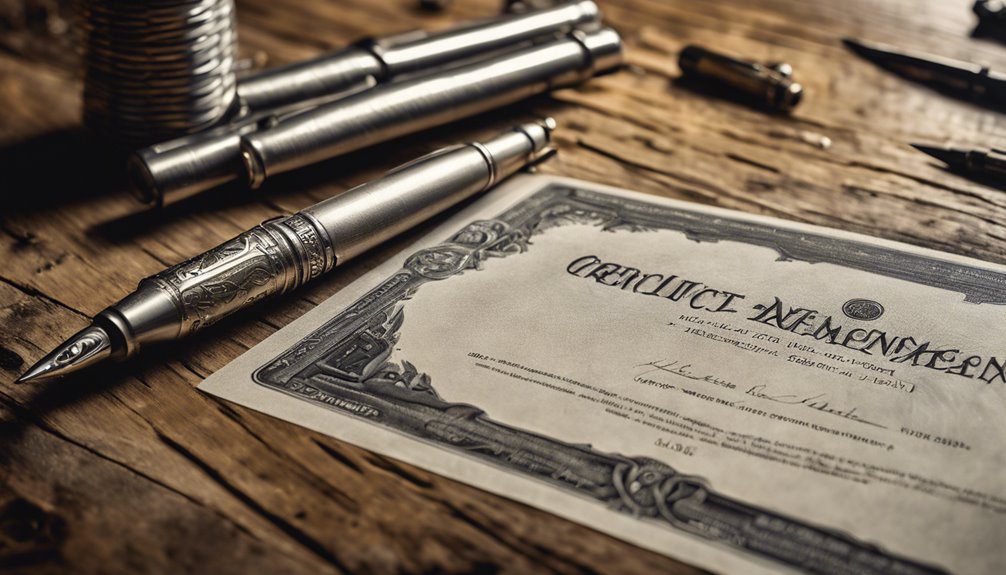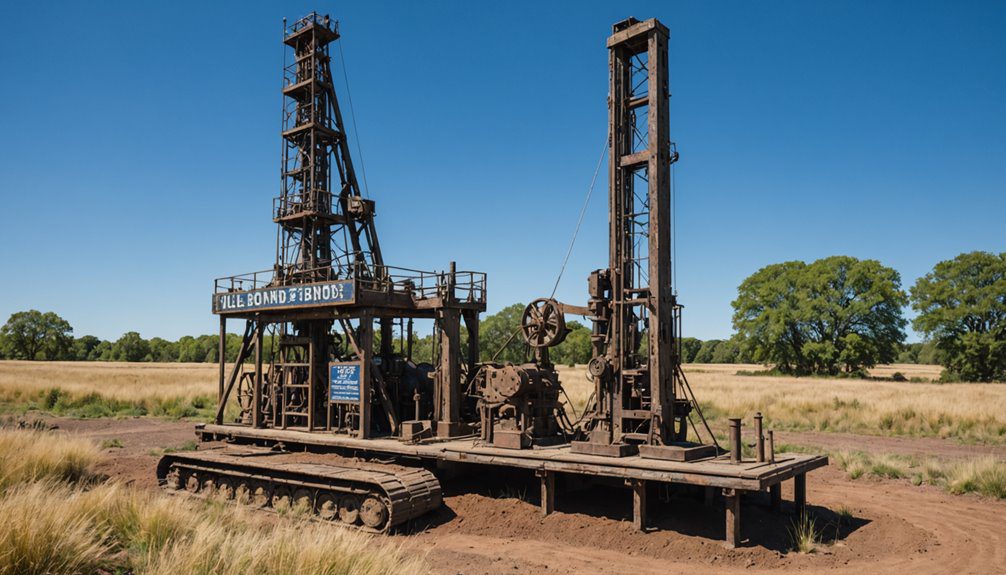If you're considering a career as a well driller in South Carolina, you need to understand the significance of the $25,000 bond requirement. This bond not only protects the public and environment but also signals your professionalism to potential clients. You might wonder about the application process, costs, and what happens if you don't comply. Each of these factors can significantly impact your business's success. So, what's the best way to navigate this bonding requirement and ensure you meet all necessary obligations?
Overview of the Bond

A well driller bond is a crucial financial tool that protects both the public and the environment. This bond acts as a guarantee that you, as a well driller, will adhere to state regulations and industry standards. By securing this bond, you're not just fulfilling a legal requirement; you're also demonstrating your commitment to professionalism and safety.
When you obtain a well driller bond, it typically involves a financial sum—often around $25,000. This amount serves as a safety net for potential claims resulting from negligence or failure to comply with relevant laws. If you violate any regulations, the bond can cover the costs of damages or penalties, ensuring that the public and the environment remain safeguarded.
In addition to protecting the community, holding a well driller bond enhances your credibility. It signals to clients and stakeholders that you take your responsibilities seriously. Moreover, this bond functions as a means of financial protection against claims arising from misconduct, further solidifying your commitment to ethical conduct.
As you work in this industry, remember that maintaining a bond not only fulfills legal obligations but also upholds your reputation as a reliable and responsible well driller. This bond is more than just paperwork; it's a vital part of your professional identity.
Purpose of the Bond
The primary purpose of a well driller bond is to ensure compliance with state regulations and protect public interests. When you obtain this bond, you're essentially guaranteeing that you'll follow the laws governing well drilling in your state. This helps maintain safety standards and environmental protections, which are crucial for preserving water quality and preventing contamination.
Additionally, the bond acts as a financial safety net. If you fail to meet your obligations or cause damage, the bond provides a source of funds for affected parties to seek compensation. This isn't just about following rules; it's about building trust within your community.
By having a bond in place, you're showing clients and regulators that you're serious about your work and responsible in your practices. Moreover, the bond can enhance your professional reputation. Clients are more likely to choose a well driller who's bonded, as it demonstrates reliability and accountability.
In essence, the well driller bond serves as both a legal requirement and a valuable tool for establishing credibility, ensuring that you can operate your business with confidence while safeguarding the interests of those you serve. Furthermore, this bond acts as a guarantee to protect the public from potential malpractice associated with well drilling activities.
Who Needs the Bond

If you're planning to operate as a well driller, you'll need to secure a well driller bond. This bond is essential for anyone intending to drill wells in South Carolina. It's not just a regulatory requirement; it also protects your clients and the public from potential financial losses due to your actions or negligence.
Whether you're an independent contractor or part of a larger company, obtaining this bond is crucial. It ensures that you adhere to state laws and industry standards.
If you're a new business owner, the bond demonstrates your commitment to responsible practices, helping you build trust with clients and stakeholders. Even established drillers must maintain their bond to continue operations legally.
In addition, some local municipalities may have specific requirements regarding well drilling, making the bond an essential part of your compliance strategy. By securing this bond, you're not only protecting yourself but also enhancing your professional reputation. Furthermore, the bond serves as a form of financial security for project completion, ensuring obligations are met.
Bond Application Process
Navigating the bond application process can seem daunting, but breaking it down into manageable steps makes it more straightforward.
First, gather the necessary documentation. You'll typically need identification, proof of your business entity, and any licenses or certifications relevant to well drilling.
Next, research surety companies that offer the $25,000 bond you need. Look for reputable providers with good customer reviews and experience in the industry.
Once you've selected a company, complete their application form. This may include details about your business operations and financial history.
After submitting your application, the surety company will assess your risk based on your creditworthiness and experience. Be prepared to answer any questions or provide additional information they might request.
Once approved, you'll receive a quote for the bond premium. Review the terms carefully before signing.
After you pay the premium, the bond will be issued, and you can submit it to the appropriate state agency or licensing board. Additionally, ensure you understand the importance of Missouri Surety Bonds as they provide financial security and trust in business transactions.
Cost and Payment Options

When considering the cost of a well driller bond, you'll find that prices can vary based on several factors, including your credit score, business history, and the surety company you choose.
Typically, you can expect to pay a percentage of the bond amount, often ranging from 1% to 15%. For a $25,000 bond, that might mean paying between $250 and $3,750 annually.
If you're looking for ways to manage these costs, many surety companies offer flexible payment options. You might be able to pay the premium in full upfront or choose a monthly payment plan, which can help ease your cash flow.
Keep in mind that opting for a payment plan might incur additional fees.
Also, consider improving your credit score or enhancing your business profile to potentially lower your bond cost. If you've got a strong financial standing, you could qualify for better rates.
Before committing, compare quotes from multiple surety companies. This way, you can find the best deal that meets your needs without blowing your budget.
Making an informed decision will save you money in the long run. Additionally, understanding local regulations for bond acquisition can further assist you in navigating the bonding process effectively.
Consequences of Non-Compliance
Failure to maintain compliance with well driller bond requirements can lead to significant consequences for your business. If you neglect to uphold these obligations, you risk losing your ability to operate legally in your state. This could result in fines, penalties, or even the suspension of your drilling license.
In addition to legal repercussions, non-compliance can damage your reputation in the industry. Clients and partners may view your failure to comply as a sign of irresponsibility, making it harder for you to secure contracts in the future.
Moreover, if a claim is made against your bond due to non-compliance, you might've to pay out of pocket, which can be financially devastating.
You should also consider that non-compliance may lead to increased scrutiny from regulatory bodies. This could result in more frequent inspections, further straining your resources.
Ultimately, staying compliant not only protects your business from penalties but also enhances your credibility and reliability in the well-drilling industry. Neglecting your bond requirements is a risk you can't afford to take, so prioritize your compliance to ensure long-term success. Additionally, understanding the importance of surety bonds can further safeguard your operations and ensure adherence to regulatory standards.
Renewal and Maintenance

Maintaining your well driller bond is crucial for ensuring uninterrupted operations and compliance with state regulations. To keep your bond active, you need to renew it on time, usually annually. Start by reviewing your bond's expiration date and set reminders well in advance. This proactive approach helps avoid lapses that could lead to penalties or disruptions in your work.
When it's time for renewal, check if your bond amount still meets state requirements. If regulations have changed, you may need to adjust your bond accordingly. Contact your surety company for any necessary paperwork and ensure you've provided all required documentation.
Additionally, maintaining good standing with your surety is essential. Pay your premiums on time and stay informed about any changes in your industry that might affect your bond.
Regularly assess your business practices to minimize potential risks that could impact your bond's validity. By staying organized and compliant, you can ensure your bond remains active, allowing you to focus on your drilling operations without interruptions.
Benefits for Well Drillers
While some may overlook the importance of a well driller bond, having one in place offers significant advantages for your business. First, it enhances your credibility. Clients are more likely to trust a well driller with a bond, knowing you're financially responsible and compliant with regulations. This trust can lead to more contracts and referrals.
Moreover, a well driller bond protects your clients. If there are issues, such as improper work or damages, your bond ensures that clients can recover losses. This peace of mind is invaluable and sets you apart from competitors who mightn't have this security in place.
Additionally, having a bond can open doors for larger projects. Many municipalities and organizations require contractors to hold a bond before awarding contracts. By being bonded, you position yourself to take on more significant, lucrative opportunities.
Conclusion
In conclusion, securing the SC Well Driller $25,000 Bond is essential for your business. It not only ensures compliance with state regulations but also protects you and your clients from potential damages. By investing in this bond, you demonstrate your commitment to professionalism and responsible practices, which can lead to increased trust and client attraction. Don't overlook the benefits—this bond can significantly enhance your credibility in the well drilling industry.

